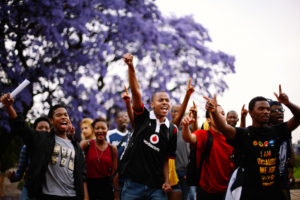Sylvia Graham: It’s time to rethink university governance structures

05102016 NETWERK24 Derde dag van Studente protesoptrede by die Universiteit van Kaapstad. Klasse op die boonste-kampus is heeldag ontwrig deur betogende studente wat gese het hulle sal aanhou om klasse te ontwrig en betoog tot daar aan hulle eise toegegee word. foto: Jaco Marais
Can we truly say that our institutions of higher learning and training are autonomous, and if not, why do we term or define them as such?
It is important to begin to critically question the true meaning of institutional autonomy and juxtapose it with the manner in which it manifests in the South African context. Despite the “autonomous” or what some might term “semi-autonomous” nature of institutions of higher learning, with respect to internal resource management, there is a continued dependence on government for financial subsidies, as recent the #FeesMustFall protests have shown, this dependence seems to influence internal institutional decision making and leadership. The rethinking of leadership and governance in institutions of higher learning is critical and long overdue. However, for that to happen we need to start having an honest discussion about what it means to be autonomous as an institution of higher learning in South Africa.
The South African higher education sector has continued to experience tremendous crisis as a result of the #FeesMustFall movement, led by students across the country. The call for free, quality, decolonised education gained unprecedented momentum in late 2015, and was triggered by exorbitant fee increases. The pronouncement of a zero percent increase and the establishment of a commission to address the higher education funding crisis by the president managed to temporarily defuse the situation. In 2016, student protests grew increasingly radical as they spread across the country in retaliation to the lax attitude demonstrated by the government since the pronouncement of the zero percent fee increment. These protests saw campuses turn into war zones, policed by private security companies in collaboration with the South African Police Service; the militarisation of campuses was employed as a tactic by the government to suppress the student movement and as such resulted in numerous arrests of students.
The pressure applied by students resulted in the #FeesMustFall movement once again claiming the top spot on the national agenda, as students persisted in their demand for free, quality, decolonised education. Vice-Chancellors and university management collectives struggled to display decisive leadership. This resulted in the development of an impasse between students and management teams. It seemed as though there was an endless chain of command, with the fees commission right at the top, followed by the Department of Higher Education and training, leaving university management right at the bottom riding on the coattails of institutional autonomy.
Students have remained resolute and committed to their call for free, quality, decolonised education. However, it has become evident that the notion of institutional autonomy is nuanced in its application pertaining to the unwavering demands of students. The announcement made in September by Minister of Higher Education and Training, Dr Blade Nzimande, in which he capped fee increments at 8% for students with a total family income of R600 000 per annum and announced a 0% increase for poor students and those that fall in the “missing middle” category, is indicative of this. It is evident that government’s voice is louder than that of institutions, especially in relation to finance and funding issues.
This has raised the question of whether universities are really autonomous. It soon became clear that institutions of higher learning either did not want to make independent pronouncements on the fees issue as it affects their respective institutions, or they were simply unable to. Thus everyone waited for government to give the green light before acting, making it clear that our institutions of higher learning are constrained in their decision making despite their claim to autonomy. A clear illustration of this was the militarisation of institutions and the conspicuous presence of SAPS on campuses during the protests.
The protests continued to gain momentum, but not to the levels observed in 2015, students clearly directed their frustration towards their campuses as well as locally based university management. Despite being told and perhaps knowing that these issues should be directed towards national government, students continued to protest at the feet of their institutions. Thus, arguably distorting the interpretation of institutional autonomy. Vice-Chancellors have confidently referred students to table their grievances before government as they could not make such decisions at an institutional level. In turn, government remained tight-lipped following the announcement of the funding structure for 2017 that was fervently rejected by students. In observing the actions of students and the continued disproportional pressure placed on universities with respect to the fees issue, it is perhaps prudent to question the nature of the relationship between government and university management with regard to decision making, leadership and governance.
The Higher Education White Paper of 1997 defines institutional autonomy as a “high degree of self-regulation and administrative independence with respect to student admissions, curriculum, methods of teaching and assessment, research, establishment of academic regulations and internal management of resources generated from public and private sources.” Thus, institutional autonomy is commonly understood as the ability of institutions of higher learning to govern themselves outside of external interference, however it may manifest. The inability of universities to decisively lead and their persistent reliance on government to provide leadership and directive in times of crisis is divergent to the principle of institutional autonomy.
The notion of institutional autonomy has had to contend with nuances such as cooperative governance, conditional autonomy and in some instances ‘strong steering’ which is essentially interference. University management struggled to offer decisive and clear leadership when faced with brute and earnest student demands for free, quality decolonised education. There is clearly a crisis in higher education and this can be, in part, attributed to a leadership and governance framework that blurs the lines in terms of institutional powers. There is a desperate need for transformation in the higher education sector. The transformation agenda should include, at its core, the reconstruction of leadership and governance structures.





A lot of words without really saying anything. Rehashing the same thing over and over. The main, and I think, only reason why the universities didn’t act on student demands was because it wasn’t their place to act on it. Never, since the establishment of the universities did they promise free tertiary education to the masses.
Those promises were done by the ANC as electioneering points to get the masses to vote for them. Yet the militarised students took it upon themselves to rather protest at universities and burn everything in their path, while also disrupting the education of fellow South Africans, rather than to protest in front of Luthuli House and burning that down.
It is thus very easy to blame the institutions for not listening or not acting when the whole crux of the matter didn’t even lie with them and they where just caught in the middle between the warring students and a government that they elected but who doesn’t care about them.
Seems to say that universities are not entirely independent because they are financially dependant on government. Takes an awful long time to say it, and is unfortunately poorly expressed and has many grammatical and other errors. “Diffuse” instead of defuse, for example.
As indicated above by Frank, the article in question seems to say very little and just serves to repeat small snippets over and over without really furthering the discussion, it smacks more of wanting to “sound intelligent” rather than demonstrating any real salient points.
Much is said about the student movement, making statements on its (author perceived) importance, and repeating the same “free, quality decolonised education” mantra over and over again (yet again without attempting to articulate what that actually means) believing that somehow that mantra alone has meaning or value (it doesn’t).
Not a great opinion piece, doesn’t really make any good points, doesn’t really further the discussion, doesn’t speak to any solutions. A bunch of empty carbs.
Our nation are falling apart everything in the country must be free, especially when it come to our youth! We are able to change a huge amount of thing in the country if we stop demanding and start working, stop spending tax payers money to enrich small number of people and the list go s on ! 90% of these so called Students demanding “Fees must Fall”are not even enrolled or active student, but suddenly we have to listen and adhere to their calls, BS!!!!! These are the rules take it or leave it ! Its that simple!!!
Excellent point made in both previous comments. Too much word fog here, partly illustrating the failure of institutions of higher education to teach clear thinking and speech, skillful problem-solving, and clear expression of one’s thoughts. We too easily assume that if some writing seems hard to understand, a) it’s our fault, and (b) it must be brilliant and profound. It’s not and it isn’t.
Campaigners to improve the situation must stop parroting fashionable jargon and grandiose demands, and start being clear and practical.
If we are to say education is a merit good ,there would be an underprovision of such good accompanied by its over pricing. There is overwhelming evidence this has been the case especially in the tertiary sector. Without bashing each other , I think its crucial to appreciate the insincerity of government in its engagement with the public ,we are all left asking the wrong question/s.
It shouldn’t be about free education ,but rather ” how can we make it more affordable for people to study given the high youth unemployment rates. Moreover the structural unemployment also posses policy questions ,as to what type of education to prioritize ,given an over supply of low quality graduates. The education challenge is a global phenomenon that businesss and societies are grappling with ,unfortunately for us we fail to see the opportunities presented to implement innovative solutions that provide meaningful economic oppportunities.
Lastly ,formal and informal learning need to be intergrated given that most employers are less interested in certificates. I am 35 now ,after several undergrad and postgraduate degrees , I wish I knew what I know now 15 years ago.The main issue isn’t varsity administration ,if we focus on that ,” we busy aligning a deck of chairs in sinking ship.
This is an interesting argument, but I would like to suggest disentangling a number of issues. To me, the idea of university autonomy pertains in the first instance to the pursuit of knowledge and understanding that is not constrained by an ideology that dictates the shape of the answers, it relates to intellectual freedom. The nature of what decolonisation involves belongs to this sphere; it constrains freedom, but it raises the valid question of the kinds of values that underpin current curricula and research agendas. To the extent that they (implicitly, and without critical examination) also advance particular interests, these need to be exposed, and universities need to move beyond them. If we take decolonisation as a critique of the hidden (or overt) biases in the current thinking, then it advances the goal of intellectual autonomy by identifying serious ideological constraints on current thinking.
Financial autonomy is autonomy at a different level, and unlikely (and undesirable) to be achieved in South Africa. If universities were not dependent on support from the taxpayers, the fees would be around 2,5 times higher, or university staff would have to be involved in commercial activities to generate additional income to the detriment of the time they spend with their students – preparing, lecturing, consulting, giving feedback. So, the taxpayers have a stake in providing quality education for society. And through its government, it has to decide how much funding is diverted to university education, in a balancing act where this demand competes with demands for health care, infrastructure, and education in earlier stages (and new vehicles for ministers as per the ministerial handbook…). Universities have no choice but to pay their staff, maintain and develop their infrastructure, stock their libraries, so there has to be money from somewhere. Since “Management” doesn’t print money, they have to find funds to cover the expenses of university education; so, to reduce tuition fees means that somebody else has to pay.
What concerns me more about the contribution, is the simplified view of the noble student warriors who strive for a just cause. This is simplified in two ways: (1) It pretends to speak on behalf of all students – whereas probably at least 75% of all students are not involved and do not actively support the cause, so to pretend to speak on behalf of all students, including those intimidated and chased out of classrooms and in some cases even assaulted by protesting students is not a fair reflection of who the “students” are, they are not a monolithic body of people united behind the “call”. (2) To present the students’ call as the noble “free, quality, decolonised education” glosses over many nuances, including less noble interests, absorbed in the movement. It would be great to have proper numbers, but on my campus, there was a strong presence among the leaders of the protesting student movement (and, NB, not the elected representatives) faced academic exclusion for failing to gain examination admission. Not so sure these were noble warriors in support of a good cause, untainted by any recklessness or self-interest; they might well have been a little spiteful and working towards obstructing other students (on my campus again, a majority in the order of 95%) from participating in the academic activities of the last few weeks before exams and actually writing exams.
So, I’m afraid there are two views of the student movement, a noble one and a more internally heterogeneous collaboration among a range of interests, and likewise two views of management – the nasty people unwilling to collaborate with students in the process of attaining a noble outcome, and the people tasked with providing an environment in which education of the best quality that the budget can afford happens; not perfect, not sufficiently critical, but that’s life, and we can continue to improve that. So, we would, I think, make more progress towards mutual understanding and a solution if we do not ennoble the minority of protesting students and elevate them to the only legitimate voice of all students, and do not portray them as victims of an uncooperative ‘management’. I don’t even know if I am part of that management, thinking of myself as lecturer first and not as mid-level manager: I certainly spend more of my time on lecturing and research than on “managing”.
No mention of the fractured student leadership and efforts in vain from university management to get a responsible representative student leadership to negotiate with. Using the phrase “free, quality, decolonised education” four times tells something about the author’s sentiments. Also no mention that the militarisition of campuses was the result of the destruction of infrastructure by students while we as taxpayers simply have to sit and watch our taxmoney going up in flames .
One sided viewpoint and that makes it an irrelevant article.
Good piece, but I think explain clearly what kind of governance reform you propose. How should universities be governed differently from the present. Make references to Higher Education Act which prescribes certain governance requirements. How should those requirements change? This could be a good master thesis.
Poorly written by a “Masters student” …..I fear for the quality of South African education
Universities are not exactly into riot control, are they? It just stands to reason that government by means of their security forces should act when lives and property are threatened, in the same way they are obliged to act when your home is threatened, or else each individual and institution will have their own private police force and/or army!
Masters you say?!
I think Sylvia Graham is making an important point here about the lack of ‘clear and decisive leadership’ offered by university management. She suggests the reason for this is the problematic frameworks that govern universities. This is a generous and critical assessment; as someone deeply embedded in the university, I would be tempted to simply describe leadership by university managers as being very poor during this time of crises. Ms Graham goes beyond this kind of knee-jerk reaction and tries to explore deeper reasons for their poor leadership.
To simply say that management was caught between government and students, and that this wasn’t their problem is really strange. Its like saying that responding to a hurricane that hits a city is not the problem of that city’s mayor (an act of nature is between the gods and the people, after all!). Surely, if a crises hits your university, you as the one’s being paid (generously) to manage the university are responsible for doing just that?
Ms Graham is pointing to something really important here that needs to be reflected on a lot more in the media and generally. So much attention has gone towards evaluating the student protests and the idea of free education, but far too little attention has been given to the far more complex issues of university governance with underpin some of the other issues.